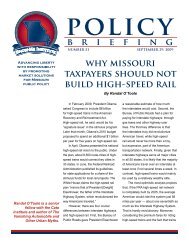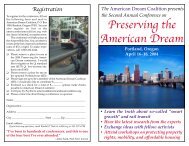MBTA Review - November 1, 2009
MBTA Review - November 1, 2009
MBTA Review - November 1, 2009
Create successful ePaper yourself
Turn your PDF publications into a flip-book with our unique Google optimized e-Paper software.
Payroll & Fringe<br />
Benefit Expenses<br />
Actual vs. Finance Plan<br />
FY01–FY08<br />
Cumulative negative<br />
$113 million<br />
$ Millions<br />
40<br />
20<br />
0<br />
(20)<br />
<strong>MBTA</strong> Expenses Actual v. Forward Funding Plan<br />
2001-2008<br />
(40)<br />
(60)<br />
FY 2001 FY 2002 FY 2003 FY 2004 FY 2005 FY 2006 FY 2007 FY 2008<br />
The <strong>MBTA</strong> currently employs 6,346 workers, of which roughly 600 are<br />
in part-time jobs.<br />
All but 263 of these workers are represented by one of 28 unions.<br />
Total headcount at the <strong>MBTA</strong> is actually down by approximately<br />
200 since the Forward Funding Plan began, while total payroll and<br />
benefits costs have increased.<br />
<strong>MBTA</strong> Hourly Wages<br />
Comparison of Ten<br />
Largest Transit Agencies<br />
Transit System<br />
Operator<br />
Top Rate<br />
San Francisco $29.19<br />
New York City $26.92<br />
Chicago $26.87<br />
Boston $26.56<br />
Washington $25.93<br />
Seattle $25.34<br />
New Jersey $24.27<br />
Philadelphia $23.54<br />
Los Angeles $21.27<br />
Atlanta $19.25<br />
(As of 1/2008)<br />
• Total payroll and benefits costs increased from $412.8M to<br />
$548.9M between FY01 and FY08 due to increases in wage, health<br />
care and pension costs.<br />
• This cumulatively exceeded Finance Plan projections by $113M.<br />
• Between FY01 and FY08, the unionized workers received<br />
average annual wage increases of 3.0%, while <strong>MBTA</strong> executives<br />
received average annual increases of 1.9%.<br />
• Non-union <strong>MBTA</strong> employees have not received wage increases<br />
since 2005.<br />
• Wage increases for union workers are comparable to the 3.5%<br />
annual growth in the Consumer Price Index-Urban Boston and<br />
Massachusetts median household income for the same time period.<br />
• The <strong>MBTA</strong>’s wage rates and total wage costs are similar to those<br />
of other top U.S. transit systems, as is shown in the table at left.<br />
The Finance Plan inexplicably projected no increases in health care<br />
costs between FY01 and FY08.<br />
• In reality, employee and retiree health benefits costs increased<br />
73%, growing from $60.6M in FY01 to $104.9M in FY08.<br />
As mentioned previously, the Transportation Reform Legislation passed<br />
in July <strong>2009</strong> has the potential at some point to help the <strong>MBTA</strong> lower<br />
its health care and pension costs by switching <strong>MBTA</strong> employees and<br />
retirees to coverage under the Group Insurance Commission (GIC),<br />
although <strong>MBTA</strong> unions have filed a lawsuit that challenges the legality<br />
of forcing benefit changes outside of the collective bargaining process.<br />
<strong>MBTA</strong> <strong>Review</strong> | <strong>November</strong> <strong>2009</strong><br />
p. 9






